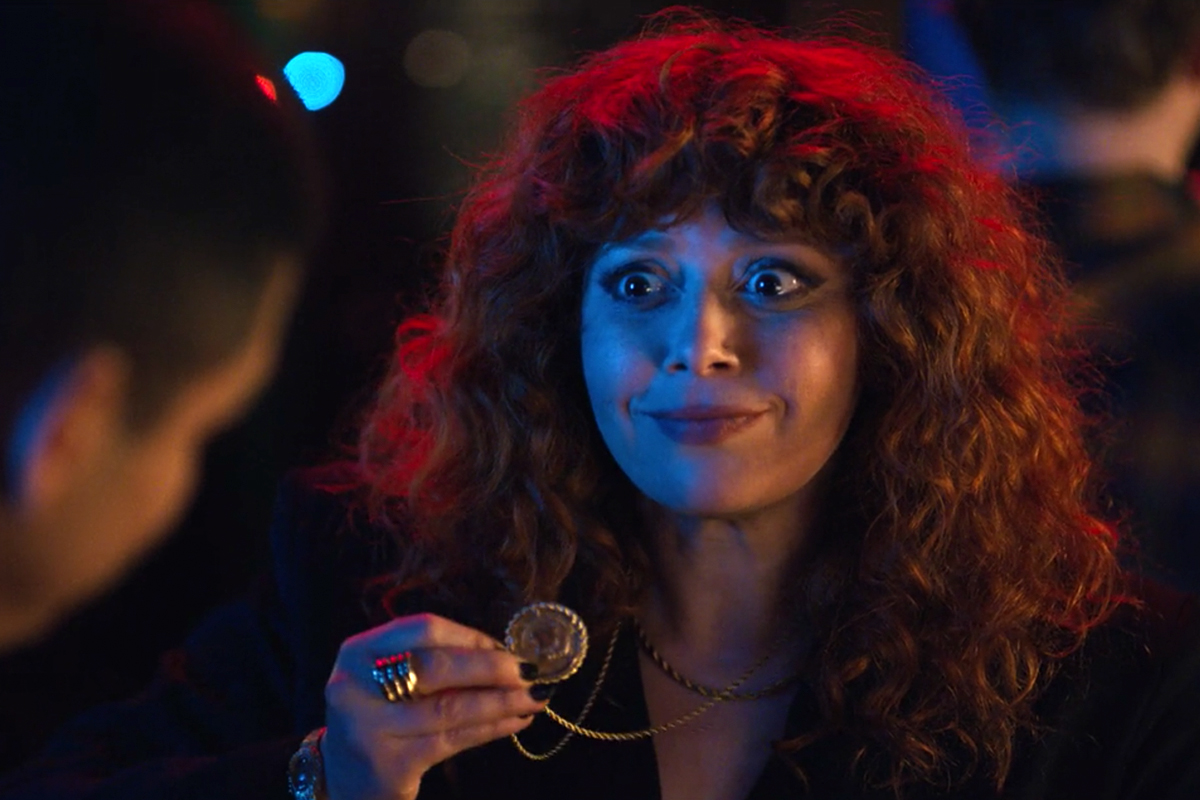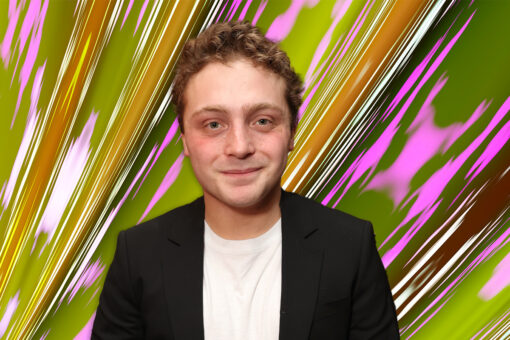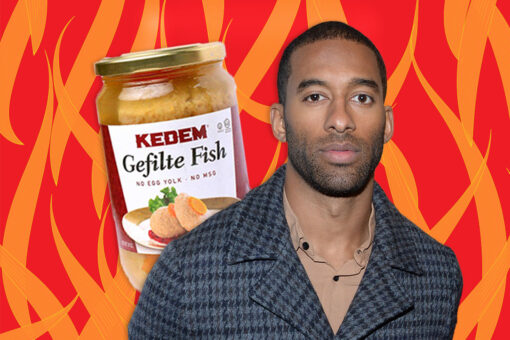Natasha Lyonne’s new Netflix show, Russian Doll, is stupendous. She plays Nadia Vulvokov, a Jewish New Yorker who keeps dying and reliving the night of her 36th birthday. She’s stuck in a time loop, a la Groundhog’s Day.
The show — and Natasha Lyonne’s performance — have received high praise. The New Yorker‘s Emily Nussbaum wrote that Lyonne “finally gets a role worthy of her magnetism,” and “scene by scene, [Russian Doll] finds raw, affecting themes about mortality and grieving, and it has some legitimately cool plot twists.” Rolling Stone‘s Alan Sepinwall called her “idiosyncratic screen presence… so distinctly New York/Jewish/aggro.”
But Russian Doll isn’t just Jewish because of Lyonne. Jewishness is embedded in the show’s DNA.
Lyonne, born Natasha Biance Lyonne Braustein, was raised in an Orthodox Jewish family. Like her character, her maternal grandparents are Holocaust survivors. Lyonne’s Jewishness informs Nadia’s — Lyonne wrote three of the eight episodes. Even the way she pronounces cockroach — “cock-a-roach” — is distinctly Jewy.
There’s also a Phillip Roth reference, a Hitler joke, mentions of irritable bowels, Nadia wishing someone “Chag Sameach,” and a whole plot point surrounding Israeli drugs.
In one episode, Nadia tells John, her ex, “Let’s take her [John’s daughter] to breakfast tomorrow morning, make everything kosher copacetic, okay?”
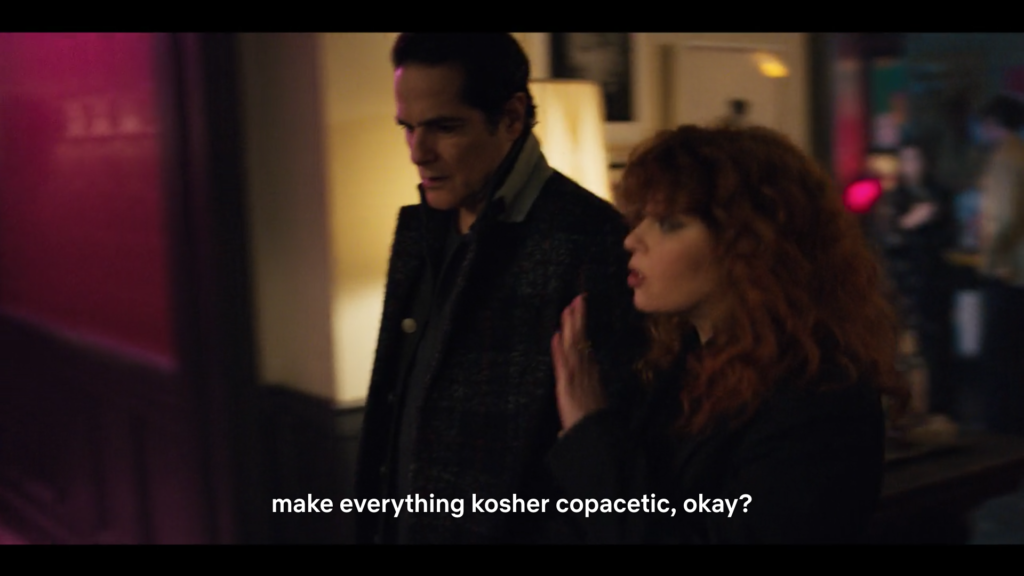
In another, Nadia asks for cottage cheese, a very Jewish food, explaining, “Look, it’s how I maintain my figure, all right?” But the Jewish references go deeper than food.
The majority of the story centers on Nadia’s 36th birthday, which — surprise! — is a significant number in Judaism. In gematria (Hebrew numerology), each Hebrew letter has a numerical equivalent. Chai (חי) is the Hebrew word for life. The word, consisting of two Hebrew letters — chet (ח) and yud (י) — is a Jewish symbol, and refers to the number 18. (Chet is 8 and yud is 10, so combined, they’re 18.) Double chai, or “two lives”? Yep: 36. The show is all about Nadia getting a second chance, which is only fitting that it happens on her 36th birthday.
Next up: Israeli drugs. As an important side-note, the joint Max offers Nadia as she walks out of the bathroom at her birthday party each time is “laced with cocaine, like the Israelis do it.” (We fact-checked with the two Israelis who work here at Alma, and they said this is “not necessarily true,” but maybe they’re just running with different crowds.)
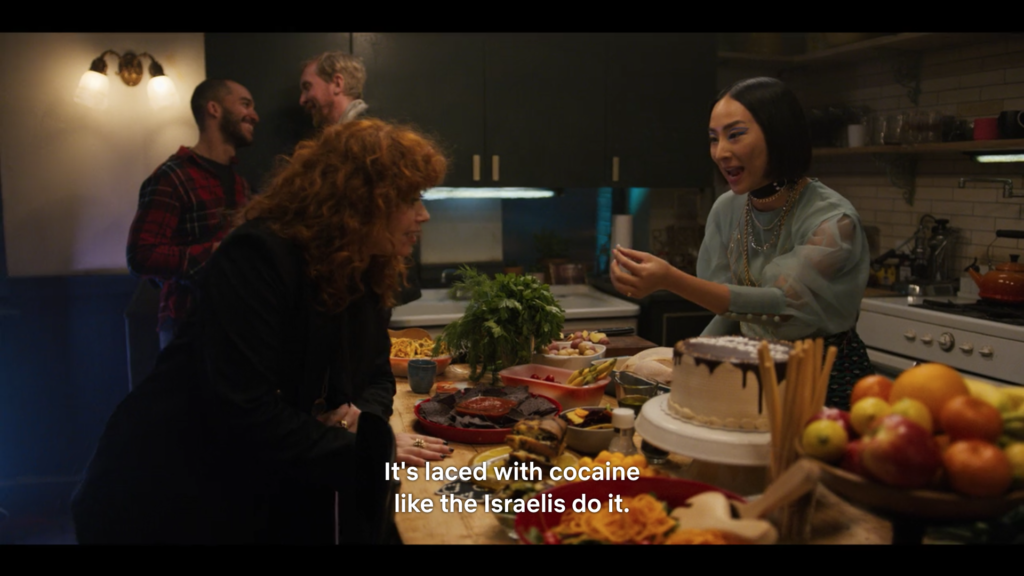
Israeli joints continue to be mentioned throughout the season (and Nadia eventually learns the joint in question was laced with ketamine, not cocaine).
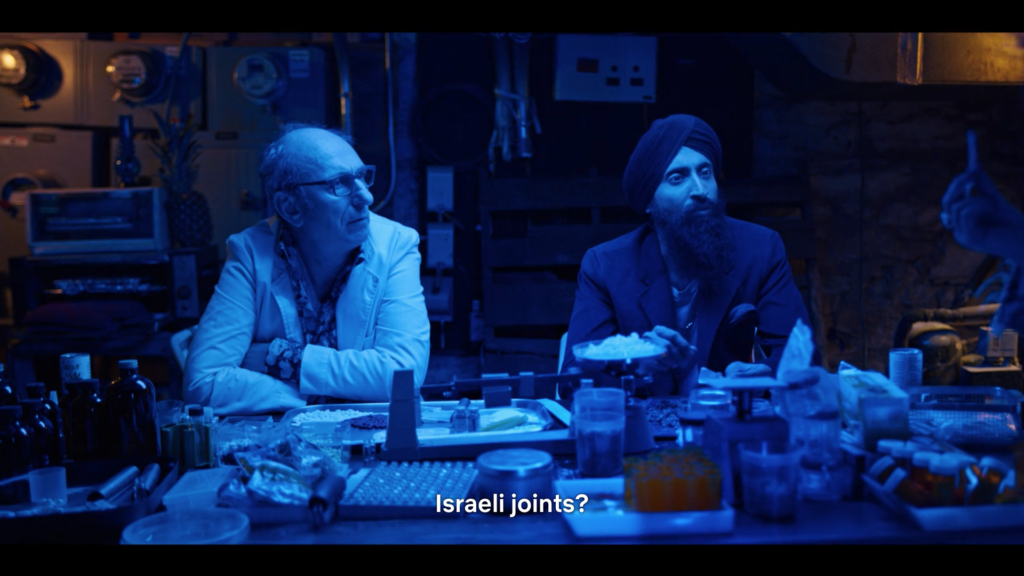
Anyhoo, moving along. Nadia’s 36th birthday party location is also of deep Jewish significance.
Nadia’s birthday party — where she keeps resurrecting to — takes place at her friend Max’s loft, which happens to be in an old yeshiva building. This is a fact Nadia first mentions in the pilot episode, before she even dies for the first time:
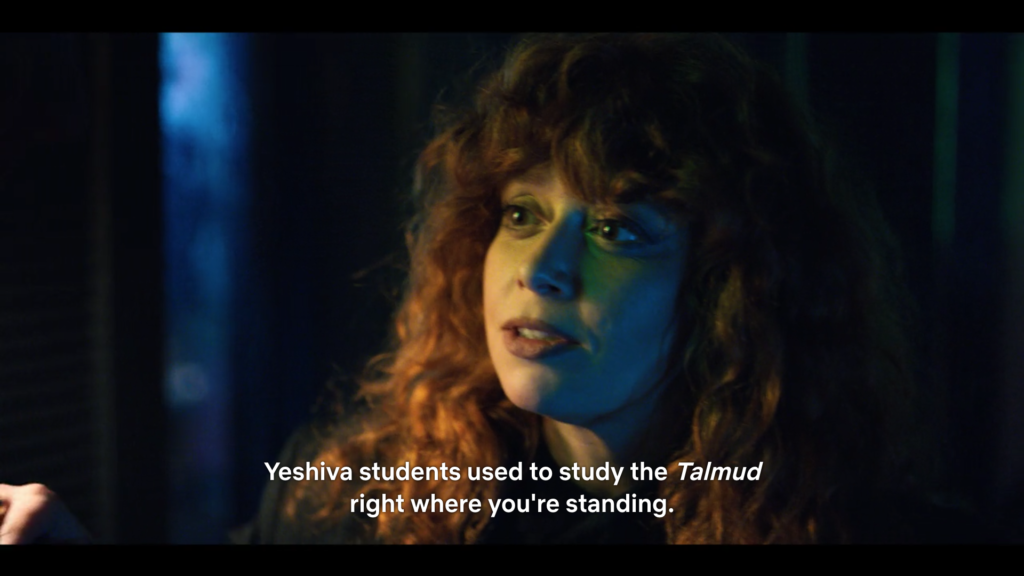
First of all, it’s rare a show will get the Jewish references accurate – the use of yeshiva and Talmud should be applauded. As Anthony Mordechai Tzvi Russell aptly tweeted, “I think it’s the first time ‘seriously yeshiva students used to study the Talmud right where you’re standing’ has been used as a pick up line.”
However, the history of the loft being a yeshiva is something that clearly bothers Nadia, and that she brings up repeatedly throughout the different time loops.
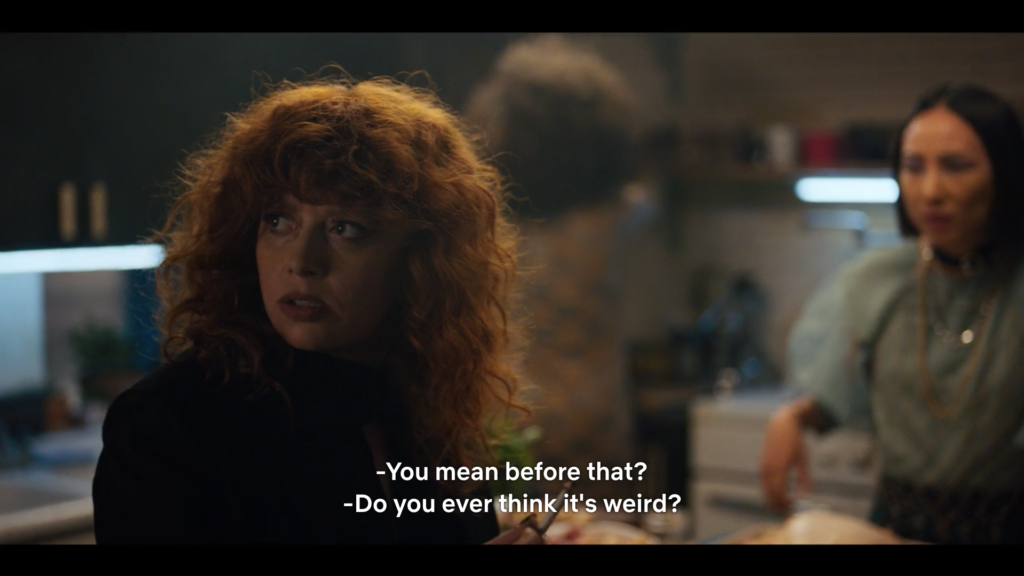
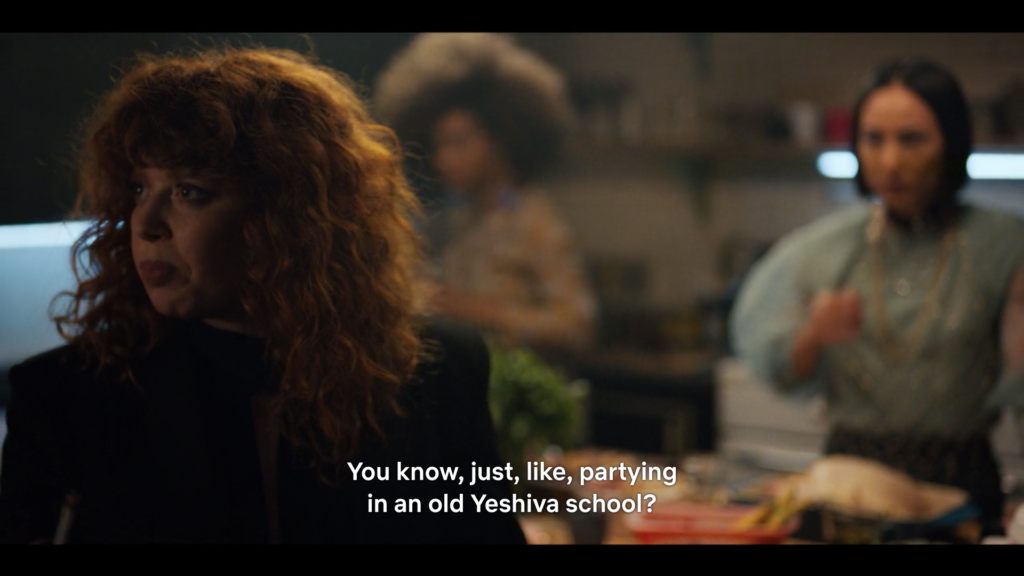
Nadia is clearly uncomfortable with the idea that this used to be a sacred place, and begins to think it could be the reason why she keeps dying and coming back to life in the building.
“It’s not the ketamine, it’s the fucking yeshiva!” Nadia exclaims in one of the funniest lines of the show.
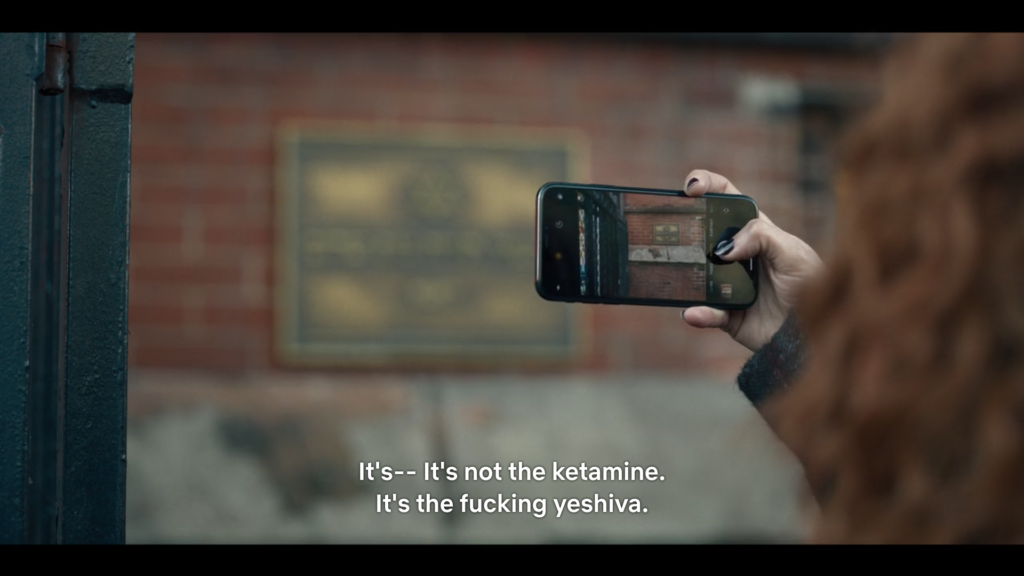
She takes a picture of the plaque, which reads simply reads “Talmud Torah Beit Shalom” (even though Nadia doesn’t know that) and goes back into Max’s loft to ask what it means.
“All right, so, this building is a yeshiva, but have you ever noticed that there is an inscription over the door that is incredibly, highly creepy?” Nadia asks. Her use of “highly creepy” says a lot about Nadia’s relationship to her own Jewishness — because she doesn’t know what it means, she assumes it must be creepy and related to the reason she’s keeps dying.
Her friend Lizzy then jumps in and asks, “Don’t you know? You’re Jewishy.”
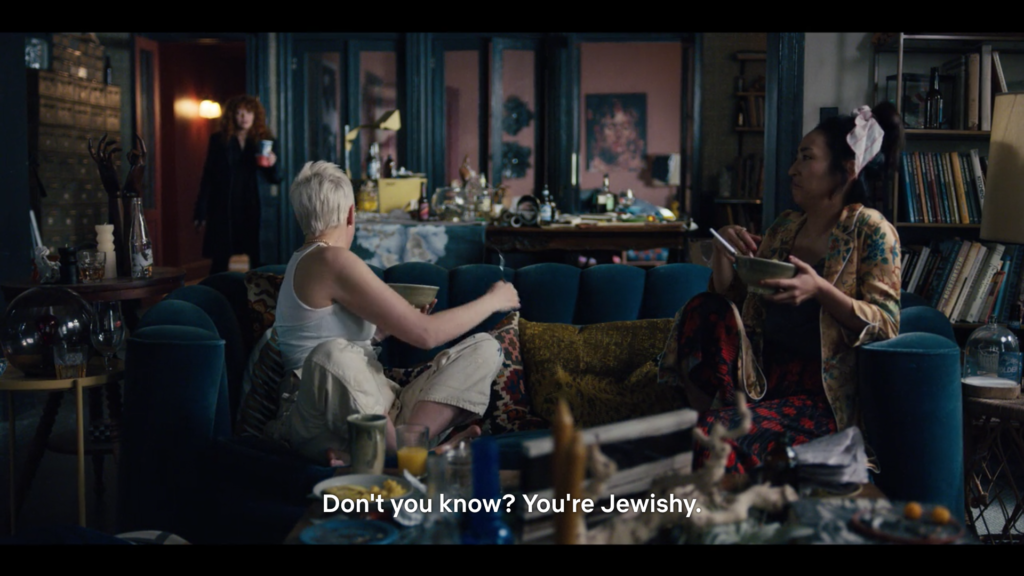
“No, not by choice,” Nadia responds. “Religion is dumb as fuck, all right? It’s racist. It’s sexist. There’s no money in it… anymore. Who needs it?”
Again: Nadia wants to show that she doesn’t need religion, doesn’t need Judaism. She is her own independent woman. Yet, later in the episode, when she’s at the synagogue that used to run the yeshiva, she asks Shifra, the rabbi’s assistant played by the wonderful Tami Sagher, if she knows the prayer for protecting someone in danger.
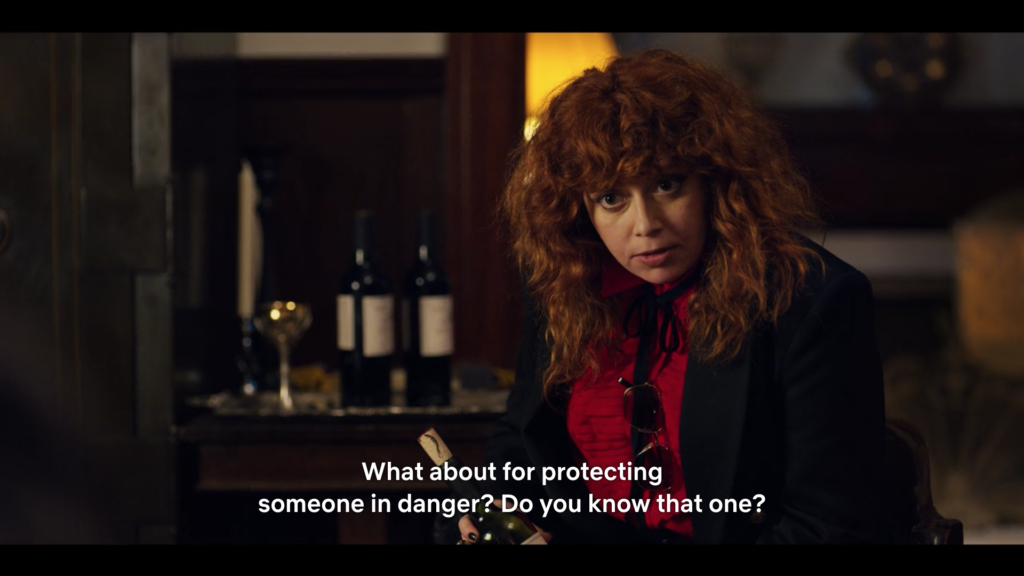
Shifra tells Nadia to come sit next to her and recites a prayer known as the bedtime Shema. As My Jewish Learning explains, “Near the end of this liturgy is a prayer asking God to protect us and guard our souls. How? Through the holy watchers, God’s angels, who walk through the night. Specifically, the text names four: ‘Michael to my right side, Gabriel to my left, Uriel before me, and Raphael to my back.'”
Nadia, clearly moved by the prayer, asks Shifra what it means. Shifra’s response? “Angels are all around us.”
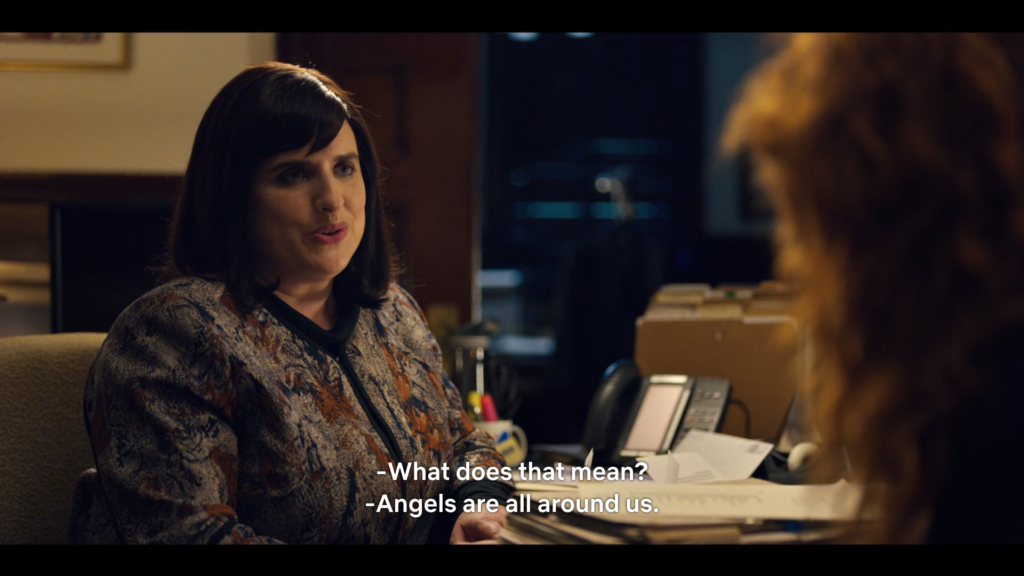
Nadia’s response, with teary eyes, is very Nadia: “Listen, thank you for the prayer, I appreciate it, I mean, it won’t do anything, but, uh, you know, thanks.”
Nadia’s inability to ask for help, or to lean on her friends, weaves throughout the season, but her asking Shifra to pray for her represents the first time she lets her guard down, just a little.
Later, when she’s with Alan (a character we will avoid explaining because spoilers), he asks her about the necklace she wears around her neck.
“Oh this. This was my mother’s,” Nadia tells Alan. “It’s a krugerrand. You know what that is?”
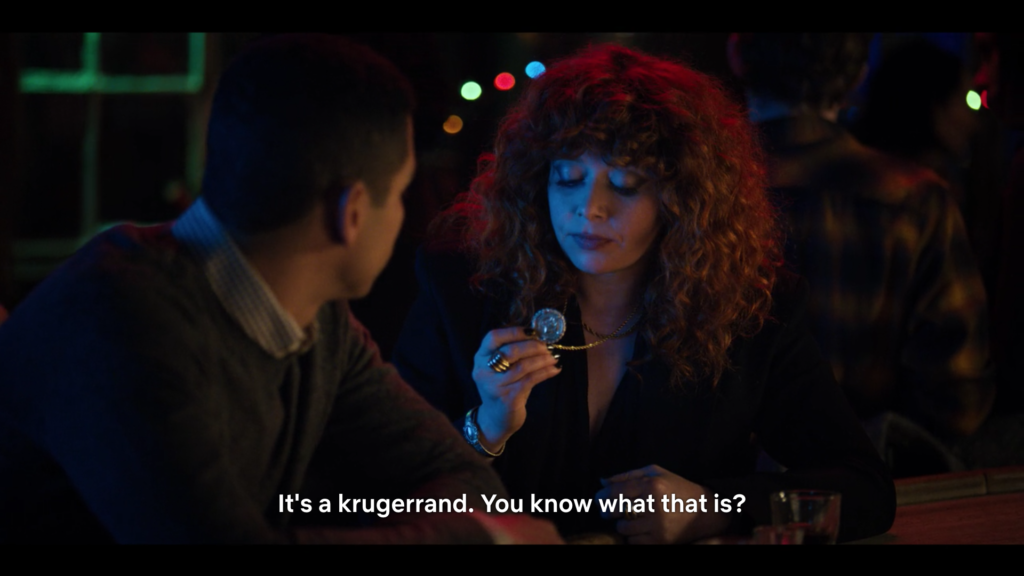
He does not, so Nadia says: “It’s a South African gold bullion. It goes for about $1,500 an ounce.”
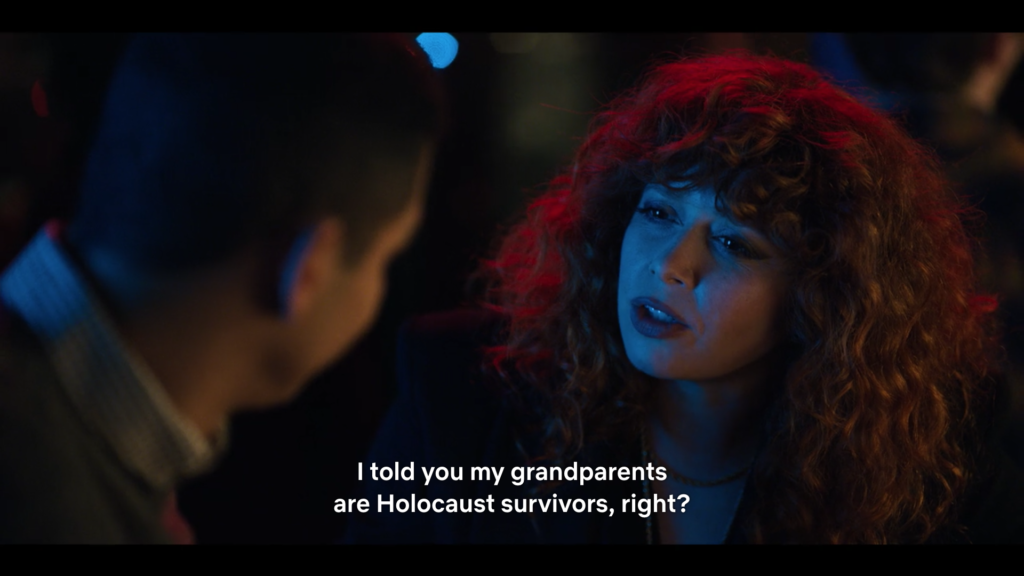
She then explains her grandparents were Holocaust survivors.
“Anyway, after the war, you know, most survivors were a little bit paranoid about putting their money in banks, so my grandparents acquired 150 of these babies, and then my mother, ’cause she’s a fucking piece of work, she spent them all except for this one.”
The darkness of this — Nadia’s grandparents survived the Holocaust, but no longer trusted anyone, and their daughter, Nadia’s mother, wasted all their money — is what makes this show so fundamentally Jewish. Not just because she’s the granddaughter of Holocaust survivors, but because the darkness is such a part of Jewish humor. Nadia is so messed up by her mom, and the guilt she carries around (we won’t spoil) forms a core part of the story and who she is.
The money was supposed to go to Nadia’s college fund — but instead, her mother spent it all.
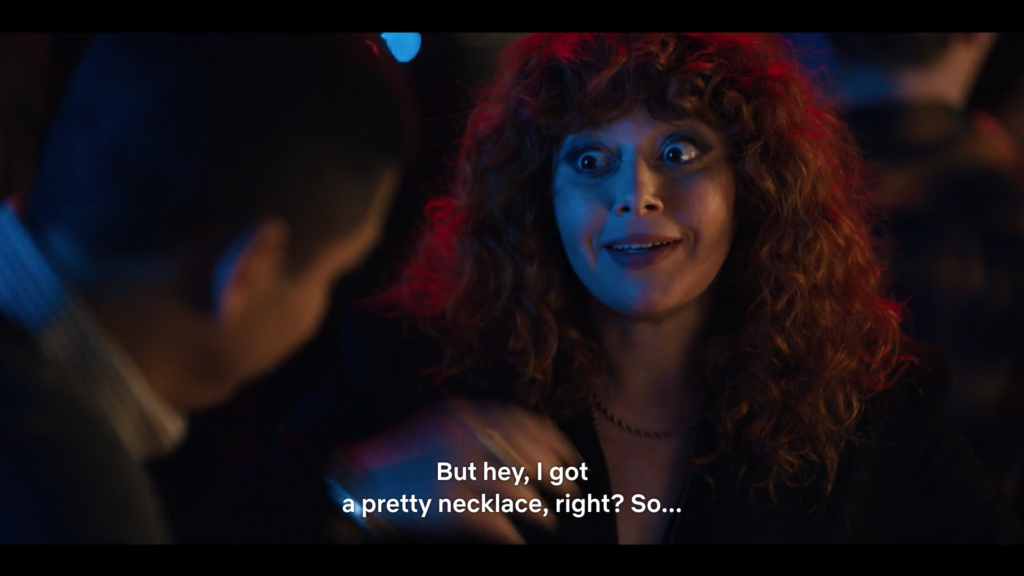
As Anthony Mordechai Tzvi Russell explained to Alma, “There is a sharp, wry melancholy that rises to meet the phenomenon of the supernatural in the series that falls very neatly into the kind of narratives one would find in the short stories by I. B. Singer—that of people suddenly caught in between worlds both mundane and fantastical.”
There’s something inherently so Jewish about the storytelling – both in the content and the structure of the series.
To end on a lighter note, the peak Jewishness of the show comes from Nadia at Town and Village Synagogue (also called Tifereth Israel). We could run a screencap from literally every frame in the scene: Nadia walking in and proclaiming “Shabbat Shalom!” even though it’s Monday, Shifra explaining how the rabbi is prepping for a big speech in Great Neck, Nadia drinking the Shabbat wine, and so much more.
But the highlight:
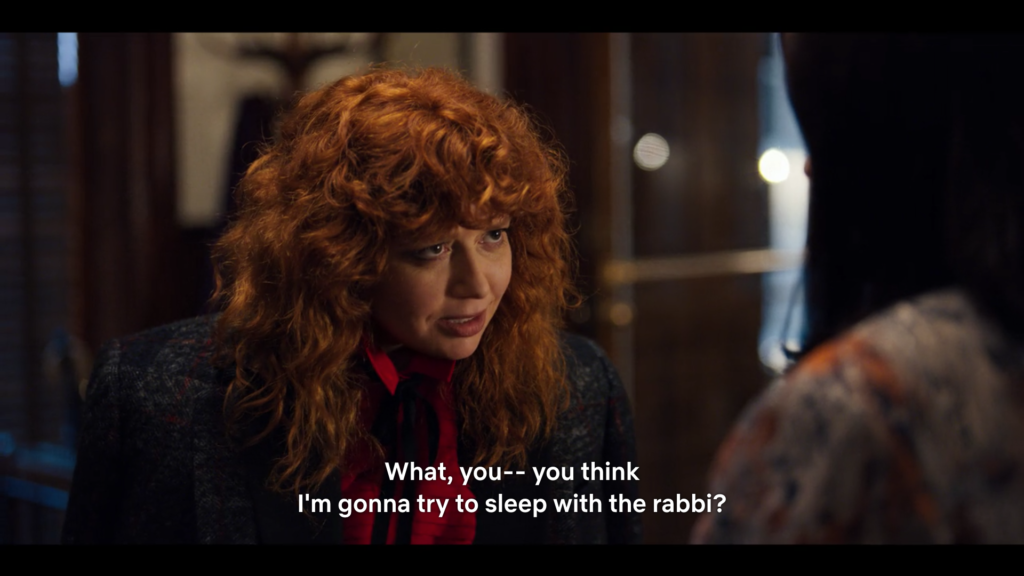
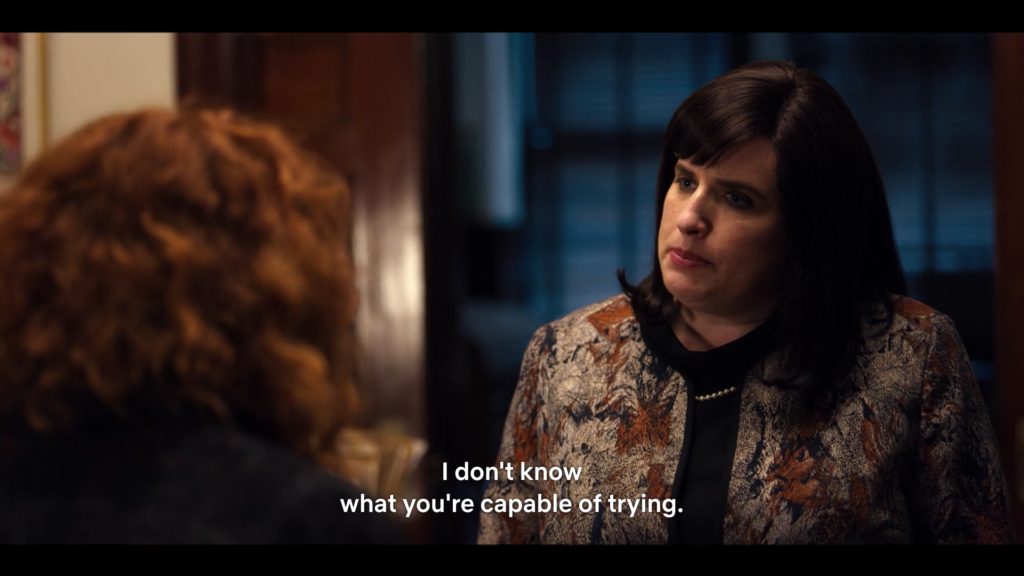
Never change, Russian Doll.
